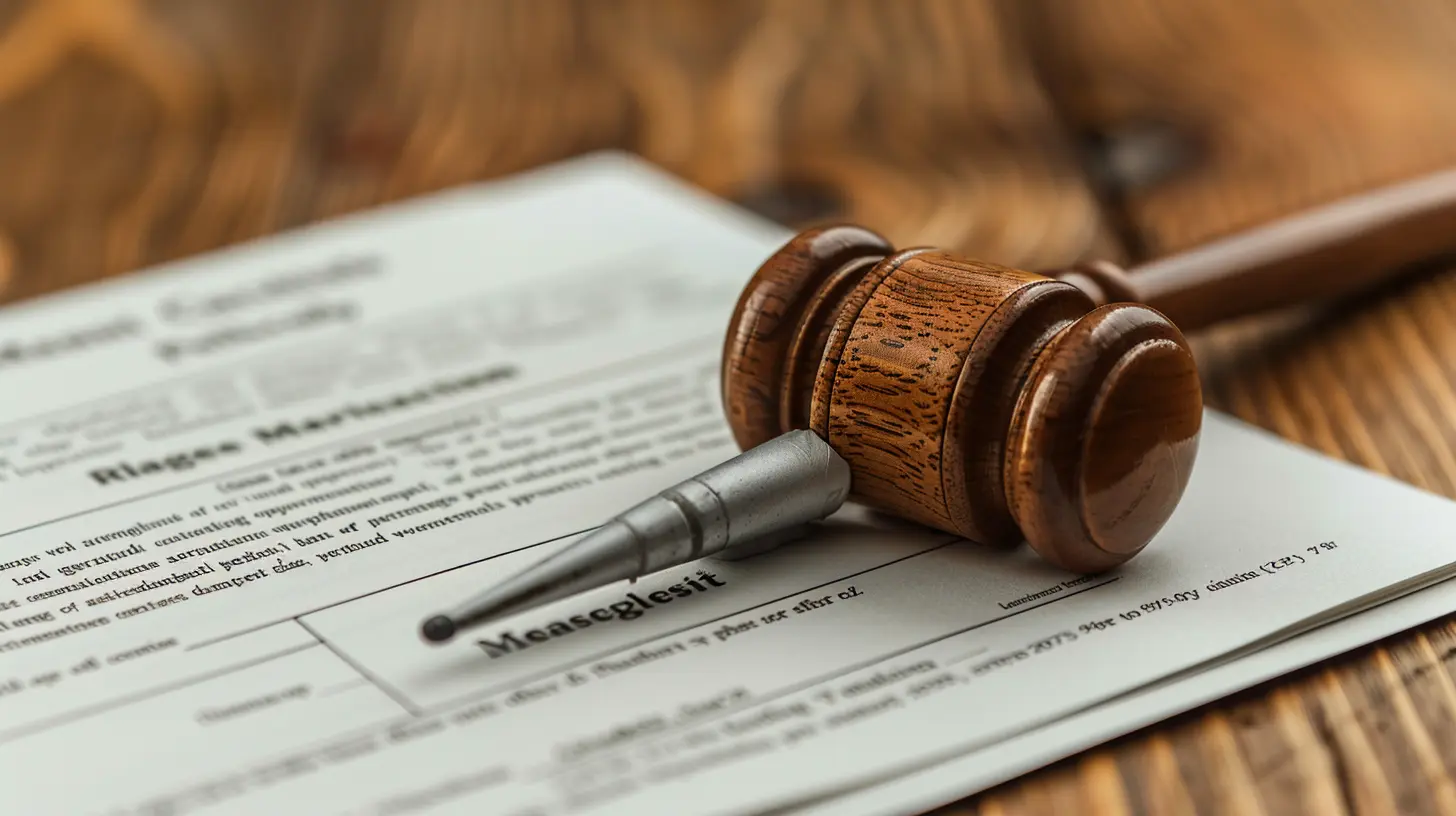Force Majeure Clauses in Real Estate Contracts Explained
29 July 2025
Imagine this: You're in the final countdown to buying your dream home. Everything's aligned—the financing is approved, the closing date is set, and you're already mentally arranging your furniture. Then BAM! A wildfire breaks out near the property, the city imposes emergency regulations, and your real estate transaction screeches to a halt. What now?
This is where a Force Majeure clause steps in like a legal superhero, offering a safety net when the unexpected turns your transaction upside down. You might’ve heard the term tossed around—maybe in a contract, during the COVID-19 pandemic, or on late-night real estate podcasts—but what does it actually mean?
Grab a cup of coffee (or wine—we don't judge), because we’re about to demystify Force Majeure clauses in real estate contracts.
What the Heck is a Force Majeure Clause?
Let’s break it down. “Force Majeure” is a fancy French term that loosely means “superior force.” In legal speak, it refers to unforeseeable events that prevent someone from fulfilling a contract. Think war, hurricanes, pandemics, government shutdowns—basically, stuff out of your control.So in real estate contracts, a Force Majeure clause acts like a pause button. If something big and unexpected goes down, it can delay or even excuse parties from performing their obligations under the contract.
Sounds like a legal get-out-of-jail-free card, right? Well, not quite. There’s a bit more nuance. Let’s keep going.
Why Should You Care About Force Majeure Clauses?
Here’s the thing—real estate transactions are riddled with deadlines, conditions, and hefty financial consequences. Missing a closing date could mean losing your deposit. Not delivering construction materials on time could trigger penalties.Force Majeure clauses give both buyers and sellers breathing room when life throws a curveball. Without one, you're vulnerable to legal trouble even if an act of God literally wrecks your plans.
Got your attention now, huh?
Real-Life Scenarios Where Force Majeure Kicks In
This isn’t just legal mumbo jumbo. Force Majeure clauses have been the real MVP in many real estate stories:1. Natural Disasters
Let’s say a hurricane hits the area where you’re buying property. Roads are flooded, inspectors can’t access the site, banks are closed. Your closing date? Probably not happening. A Force Majeure clause can extend deadlines without penalties.2. Global Pandemics (Yep, We’re Looking at You, COVID-19)
COVID-19 was the ultimate Force Majeure wake-up call. Construction delays, government shutdowns, and employment disruptions turned real estate into a house of cards. With proper Force Majeure wording, contracts could be paused until things normalized.3. Labor Strikes or Supply Chain Disruptions
If you’re a developer and your construction materials are stuck on a ship somewhere because of a port strike, your timeline just took a hit. A Force Majeure clause might save you from breach of contract accusations.
What’s Typically Covered?
Not all Force Majeure clauses are created equal. Here’s a peek at what they usually include:- Natural disasters (earthquakes, floods, hurricanes, etc.)
- War or terrorism
- Government actions (emergency laws, curfews, etc.)
- Pandemics or epidemics
- Labor strikes
- Supply chain interruptions
But here’s the kicker—some clauses are super specific, while others are broad and vague. Want the good stuff? Make sure you or your lawyer spell it out loud and clear.
Not Everything is Force Majeure Material
Let’s draw a line in the sand. Just because something is inconvenient or unexpected doesn’t mean it qualifies as Force Majeure.🚫 Market crashes? Not Force Majeure.
🚫 Losing financing? Nope.
🚫 Buyer’s remorse? Definitely not.
The event needs to be truly outside your control and directly impact the performance of the contract.
Buyer vs. Seller: Who Benefits More?
Ah, the million-dollar question. Spoiler alert—it depends.- Buyers benefit if disasters delay inspections, financing, or possession dates. They get more time without legal penalties.
- Sellers, especially developers or landlords, benefit when construction, delivery, or occupancy timelines get disrupted.
The key is balance. A well-drafted Force Majeure clause should protect both sides fairly. If it leans too heavily one way, that power imbalance can cause some serious drama later.
How to Draft a Rock-Solid Force Majeure Clause
Alright, now we’re getting to the good stuff. If you’re in the process of buying, selling, or building, you’ll want your Force Majeure clause to be airtight. Here’s what to look for:1. Clear Definitions
Don’t just call it “uncontrollable events.” Spell out exactly what qualifies. Mention floods, earthquakes, pandemics—whatever applies to your region or project.2. Notice Requirements
The clause should require the impacted party to notify the other party within a specific timeframe (usually within a few days) once the event occurs.3. Time Extensions
It should clearly state that deadlines or obligations will be extended for the duration of the Force Majeure event.4. Termination Conditions
If the event drags on too long, the clause should lay out whether and when the parties can walk away without penalties.5. Mitigation Obligation
The party invoking Force Majeure usually has to make reasonable efforts to minimize the delay or damage. No hiding behind the clause while ignoring responsibilities.Red Flags To Watch Out For
Beware of vague language like “any other unforeseen events.” That’s a legal grey area that can lead to disputes. Also, make sure the clause doesn’t unfairly benefit just one party—it should offer mutual protection.If you're feeling unsure, consult a real estate attorney. A few hundred bucks now can save you thousands (and a bucket of stress) later.
How COVID-19 Changed the Game
Before 2020, most people glanced over Force Majeure clauses like they were boring fine print. But once the world shut down, everyone—and we mean everyone—wanted to know if they could invoke Force Majeure.Some could. Some couldn't. Why? Because their contracts didn’t specifically list “pandemics” or “government shutdowns.” The lesson? Never assume your Force Majeure clause covers everything. Be specific. Be thorough. Be paranoid in a good way.
Tips for Real Estate Investors and Buyers
Whether you're investing in multi-family units, flipping houses, or buying your first home, here are some parting pro tips:🛑 Don’t assume a Force Majeure clause exists—check your contract.
🛠️ Customize your clause to fit your deal, location, and potential risks.
📜 Keep detailed records if you ever need to invoke it.
🔎 Review the clause with a lawyer before signing the dotted line.
You wouldn’t build a house without a strong foundation. So why sign a contract without one?
The Bottom Line
Force Majeure clauses might sound like something only lawyers care about, but they’re actually your secret weapon in the unpredictable world of real estate. From tornadoes to pandemics to striking dock workers, these clauses can mean the difference between a minor delay and a full-blown financial disaster.So the next time you're buying, selling, or building—ask yourself: If chaos strikes, is my contract ready?
A fair and clearly written Force Majeure clause can help you sleep better at night. Because in real estate, the only thing worse than a bad deal… is a good deal gone bad due to an act of God.
all images in this post were generated using AI tools
Category:
Real Estate ContractsAuthor:

Cynthia Wilkins
Discussion
rate this article
1 comments
Lillian McNaughton
Great overview! Understanding force majeure clauses is essential for navigating real estate transactions effectively.
August 6, 2025 at 4:26 AM

Cynthia Wilkins
Thank you! I'm glad you found it helpful. Understanding these clauses is indeed crucial for any real estate transaction.


